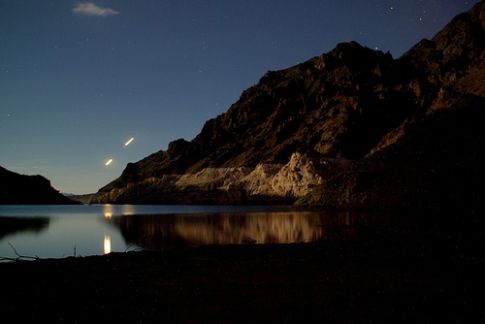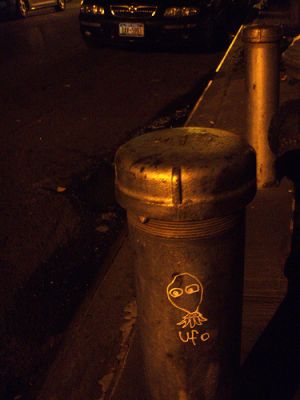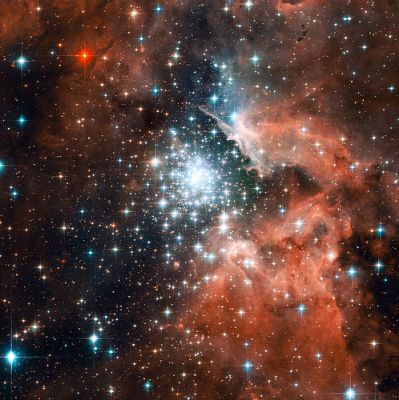
image: Adam Baker
What a great way to wrap up the summer. Cassini finds liquid hydrocarbons on Titan, making it the only other place we know of with natural lakes and charging up the search for life outside Earth. Phoenix Lander finds water ice in the Martian soil, adding credence to the suspicion that microbes might once have evolved there. And, oh yeah, an Apollo astronaut admits that the government has been covering up alien encounters for sixty years.
You heard right. Grays are back in the news this month, though lamentably they make no appearance in the new X-Files movie, which I feel obliged to warn readers against seeing (unless you enjoy being simultaneously bored and nauseated). This time, however, their existence was promoted almost offhandedly as established fact by Dr. Edgar Mitchell, MIT graduate and the sixth human being to walk on the moon.
Dr. Mitchell's commentary, which can be heard here, was made on Britain's Kerrang radio. Among the highlights:
'I happen to have been privileged enough to be in on the fact that we've been visited on this planet and the UFO phenomena is real . . .
'It's been well covered up by all our governments for the last 60 years or so, but slowly it's leaked out and some of us have been privileged to have been briefed on some of it . . .
'I've been in military and intelligence circles, who know that beneath the surface of what has been public knowledge, yes - we have been visited.'
Heads spun - mine did, anyway - when this one hit the blogosphere. And that's my fault; I fell prey to one of the most common errors in thinking, known in logician circles as "ipse dixit."
Ipse dixit, Latin for "he said it himself," is a mistake in reasoning that occurs when we confuse authority in one field for authority in all fields. I happen to agree with many of Albert Einstein's opinions on human rights and nuclear non-proliferation, but if I accepted them on the grounds that he was a brilliant physicist, I would be guilty of ipse dixit: physics and politics are different endeavors. Celebrity in particular may often be confused for credibility, especially in our current media-saturated environment. For the most part this confusion results in little more dangerous than Britney telling us the administration is truthful and Bruce telling us it isn't. But every time we think it sensible that Angelina Jolie should represent the U.N., or that Bono should spearhead a campaign for African debt relief, we confuse credibility as a pop star for credibility, however well intentioned, in vastly different pursuits.

image: Daquella manera
Things are a bit more subtle in Dr. Mitchell's case. You take your chances listening to Dr. Phil, who isn't, you know, an actual "physician" or anything; Dr. Mitchell has literally been to the moon. But that's still ipse dixit, because walking on Earth's satellite doesn't give one special authority to pronounce on all things outer space. The mild shock we experience when hearing a high-level NASA employee of any sort seemingly outing a worldwide governmental conspiracy to conceal alien contact is lessened somewhat when we discover that during his space flight Mitchell spent time trying to establish psychic contact with friends on Earth. It trembles when we read that he feels he was cured of kidney cancer by a teenage "remote healer." And it crashes like a saucer at Roswell when we find that after his exemplary service on Apollo 14 he went on to co-found the Institute of Noetic Science, which conducts research into ESP, parapsychology and other "paranomal" stuff.
So astronauts turn out to be actual people, a fact I have celebrated on this blog before (as well as the fact that there are foundational questions we already know can't pay off and so aren't worth the asking). They are susceptible to the same faulty reasoning which we all, as a species, inherit. This doesn't, of course, mean Dr. Mitchell's claims about aliens are false -- to leap to that conclusion would be to commit another error in reasoning, this time the "genetic fallacy" -- but that any such claim must stand or fall based on its own merits. We should also keep in mind that such an extreme claim would require rigorous and compelling evidence indeed.
Unfortunately, those merits turn out to be nothing much. Dr. Mitchell is personally convinced that some of the UFOs people have seen are of extraterrestrial origin (ipse dixit), he's talked to people who have met aliens (hearsay), unnamed intelligence people have told him (hearsay) that they believe (ipse dixit) the Roswell crash was real, and so on. There's nothing new here, except perhaps the suggestion that the Vatican is in on the secret and is gradually building a PR campaign to make the inevitable revelation of E.T. contact less threatening to their ideology. Indeed, given the almost commonplace nature of this narrative - Roswell, grays, government secrecy, Phoenix lights, smoke-filled room -- it's hard to see in what way this information has been "covered up."
But wait. Is there nevertheless something Dr. Mitchell *has* experienced first-hand - something profoundly unusual on which can he speak as a direct witness? Yes. And it is something, as it turns out, far more interesting than Scully and Mulder. In his own words:
"I was coming back from the moon after completing a successful mission on the moon. My job was being responsible for the lunar spacecraft for the lunar surface activities. So on the way home, my successful job had been mostly completed and we were just coming home. We still had experiments and work to do, but the big stuff was done.
"We were orientated such and rotating in order to keep the thermal balance of the spacecraft so that every two minutes you could see the Earth, the moon, the sun and a 360-degree panorama of the heavens came through the window every two minutes. That's powerful stuff, particularly since it's space. Without the atmosphere to block, the stars don't twinkle, and there's 10 times as many as you could possibly see on Earth because of the lack of interference and it's much closer to what you could see through the Hubble Telescope these days, with those pictures and I hope you've looked at some of those: it's overwhelming -- and I realized as that happened, because I do have a PhD from MIT and I studied astronomy at Harvard and MIT and knew that molecules of matter in my body and in the spacecraft and in my partners' bodies were made in some ancient generation of stars. That's where matter is created.
"Suddenly I realized that the molecules in my body were created in an ancient generation of stars and suddenly that became personal and visceral, not intellectual and I had never had this experience. It was accompanied by bliss, an ecstasy I had never experienced."
This rapture of the skies changed Dr. Mitchell, and he has been pursuing its implications for his own life ever since. I don't follow him, or others, when those implications lead in what I consider irrational directions, but I applaud him for having both the intelligence and the largeness of soul to respond so completely to an experience of this magnitude. I feel this rapture myself not infrequently -- when looking through a backyard scope on sharp, clear night in winter; when discussing foundational research projects with FQXi grantees who are studying micro black holes or quantum reality or the possibility of a multiverse; when contemplating our slowly evolving awareness as it has proceeded through philosophers and scientists from Democritus and Aristotle up to Spinoza, Newton, Einstein. It is the sense of immensity, both internal and external, that is the incalculable gift of science--the awareness that we are part of an infinite nature.
I envy Dr. Mitchell his close encounter with the Milky Way. The experience must have been immense.

image: image editor